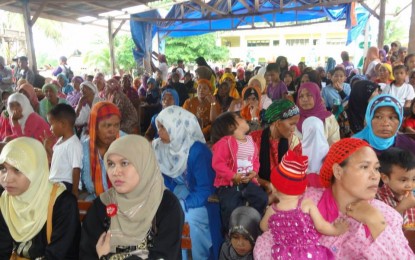
Sacol residents
ZAMBOANGA CITY – Barangay officials of two pre-dominantly Muslim communities in Zamboanga City were questioned by members of the Sangguniang Panlungsod over their respective resolutions petitioning for their inclusion in the soon to be Bangsamoro Autonomous Region (BAR).
In the resolutions of Barangays Busay and Landang Gua in Sacol Island, which lies a few kilometers from the eastern coast of the city, majority of the two villages’ officials purportedly ask the Commission on Elections to include their barangays in the coming January 2019 plebiscite to ratify the Bangsamoro Organic Law (BOL).
Their separate resolution has been filed with the central office of Comelec recently.
The petitions immediately raised hackles of city residents because in three previous plebiscites, they overwhelmingly rejected inclusion in the Muslim autonomous government, and their general sentiments remain unchanged despite the passage of the new BOL that would transform and enlarge the present Autonomous Region in Muslim Mindanao (ARMM) into the new BAR.
During the city council hearing held on Nov. 19, Antonio Abdullah, barangay chairman of Busay, denied that he and his seven councilors held a session last October 21, during which they approved the purported resolution.
He and his councilmen added that their signatures in the document were forged.
On the other hand, the councilors of Landang Gua admitted that they affixed their signatures on the resolution when it was passed around.

They were, however, told that the document was a petition for the construction of a water system and solar panels in their island barangay.
During the public hearing, one of the barangay officials lamented that their island is underserved in terms of these basic utilities.
While village officials of Busay admitted to be clueless where the resolution attributed to them originated, the officials of Landang Gua said a certain Usman Isnani masterminded their questionable petition.
Isnani, who was present in the hearing, said he acted on behalf of his brother Ben, who was declared winner of last year’s barangay elections by Comelec by virtue of an election protest he had filed against the proclaimed winner Banjamin Abdullah, who currently holds the office.
However, the latter in turn filed an appeal to the Comelec and no final resolution has been issued.

Under the BOL, local political units contiguous to any of its enumerated territories may appeal to join the BAR through participation in the January plebiscite.
BOL’s Article III, Section 2 (f) states: “All other contiguous areas where a resolution of the local government unit or a petition of at least ten percent (10%) of the registered voters in the area seeks for their inclusion at least two (2) months prior to the conduct of the ratification of this Organic Law. . . The establishment of the territorial jurisdiction of the Bangsamoro Autonomous Region shall take effect upon ratification of this Organic Law by majority of the votes cast in the above- mentioned territorial jurisdiction in a plebiscite conducted for the purpose: Provided, That in all cases, the political units directly affected shall vote favorably in the plebiscite, as provided in Section 3, Article XV of this Organic Law.”
Article XV, Section 3 (f) states: “Any other contiguous area where there is a resolution of the local government unit or a petition of at least ten percent (10%) of the registered voters in the local government unit asking for its inclusion at least two (2) months prior to the conduct of the ratification of this Organic Law shall form part of the Bangsamoro Autonomous Region if the majority of the votes cast in the political units directly affected shall be in favor of the inclusion of the petitioning local government unit in the Bangsamoro Autonomous Region.”
There is, however, no definition in the BOL itself what consists a contiguous area, although there are offshore measurements of its territorial waters.
The Sangguniang investigative public hearing was conducted by the Committee on Ordinance chaired by Councilor Cesar Jimenez.
Forged documents
Towards the end of the four-hour session, he warned that those found responsible for forging the resolutions could face criminal charges like falsification of public documents.
When the report of the hearing is accomplished, the SP will seek the aid of the city government’s legal office for such action, he said.
After learning about the existence of the barangays’ resolutions, the city hall issued a statement stating that Mayor Beng Climaco “calls on all Zamboanguenos- Christians, Muslims or Lumads - to stand united and strongly oppose any move to dismember the territorial integrity of the city.”
"Zamboanga City should never form part nor be included in the Bangsamoro, now or ever,” she said in the statement.
Councilor Jihan Edding said she believes the resolutions will not prosper in the Comelec because of their infirmities and lack of supporting documentary requirements like an SP resolution attesting them.
Zamboanga City District I Rep. Celso Lobregat, a member of the Congressional bicameral committee that gave the BOL its final form and enactment approval, warned that if Comelec will act favorably on the barangays’ resolutions, then Zamboanga City will be included in the January plebiscite to ratify the BOL despite that the law excluded the city from its specified mandated territory.
The controversial resolutions, however, seem to indicate that some Muslim residents of the city aspire to become constituents of BAR. (PNA)
